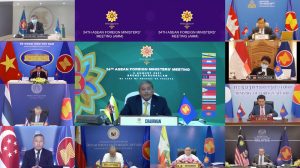Southeast Asian foreign ministers on Wednesday picked Brunei Second Foreign Minister Erywan Yusof as their special envoy to Myanmar, in a breakthrough after months of delay for regional mediation to help end the country’s deepening crisis.
In a joint statement after their annual meeting, foreign ministers of the Association of Southeast Asian Nations (ASEAN) said Erywan will begin his work in Myanmar to “build trust and confidence with full access to all parties concerned.”
The 10-nation bloc has been under increasing international pressure to act on violence and instability in Myanmar, an ASEAN member state where the military in February toppled the elected government of Aung San Suu Kyi and cracked down on opponents.
The ministers reiterated their concerns, including reports of fatalities and violence, but they stopped short of calling for the release of political detainees, saying only they “heard calls” for their freedom, in a reflection of the sensitivity over the issue.
The regional group is hamstrung by its bedrock policy of noninterference in the domestic affairs of member nations and in its decision-making by consensus, meaning just one member state can shoot down any proposal.
Erywan was among at least four candidates proposed by the grouping, and Myanmar was believed to have preferred a former Thai diplomat. Its decision to cave in to the grouping’s demands indicated the military rulers are still hoping to rely on ASEAN support as they face international condemnation.
A Southeast Asian diplomat said foreign ministers had picked Erywan at their meeting Monday but couldn’t announce it as Myanmar hadn’t given the nod.
The ministers held another session earlier Wednesday and finally managed to persuade the military government, said the diplomat who spoke to The Associated Press on condition of anonymity because of a lack of authority to speak publicly.
Even with the envoy’s appointment, it remains uncertain if and when the Myanmar military leaders would allow access to Aung San Suu Kyi, who has been detained with other political leaders and put on trial on a slew of charges, diplomats have said.
More than 900 people have been killed by Myanmar authorities since the February takeover, many in anti-government protests, according to a tally kept by the independent Assistance Association for Political Prisoners. Casualties are also rising among the military and police as armed resistance grows in both urban and rural areas.
Myanmar’s troubles have deepened with its worst coronavirus surge, which has overwhelmed its crippled health care system.
ASEAN leaders have called for an end to the violence and the start of a dialogue among parties to be mediated by an ASEAN envoy. Myanmar’s military leader Min Aung Hlaing has repeated his pledge to hold fresh elections in two years and cooperate with ASEAN on finding a political solution.

































